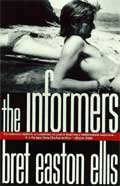 This book review was originally published in the Virginian-Pilot and Ledger-Star on August 28, 1994.
This book review was originally published in the Virginian-Pilot and Ledger-Star on August 28, 1994.
So what do you do after you’ve written the sickest novel of the decade?
That seems to be the defining question of Brat Pack writer Bret Easton Ellis’ career these days, and it’s not an easy one to answer. Three years ago, Ellis’ incendiary novel American Psycho dominated the public imagination with its eerie depiction of a Wall Street hotshot who has a sweet tooth for blood. The scenes of female torture and mutilation — which were widely misinterpreted as a sign of misogynistic tendencies on the part of the author himself — turned thousands of stomachs and certainly caused more than one missed night of sleep.
Now it’s 1994, and we can watch most of that on TV every day in the O.J. Simpson murder case. Violence, carnage, brutality — yawn, what else does Ellis have to show us?
Based on his new novel, The Informers, the answer seems to be: not much. A collage of drug deals, infidelities, and occasional slayings, Ellis’ new novel harks back to his highly overrated debut, Less Than Zero, both in style and theme. But aside from its dissolute atmosphere of hazy West Coast hedonism, The Informers merely drifts unimpressively from one scene to the next, resounding themes of moral decay that just don’t seem all that urgent or true to life.
The characters that people The Informers hail mostly from that fast-living, high-spending alternate universe in Southern California known as Hollywood. We have rock star flavor of the month Brian Metro, coasting listlessly through a world tour while his agent tries to keep him sober enough for public appearances; we have big movie studio executives and their families, drinking and doping their way through an indistinguishable line of affairs and drug scores; and, in the novel’s most outlandish touch, we have a group of twentysomething vampires who trade bloodsucking tips and gossip about the trendiest ways to decorate their coffins.
In a dizzying series of first-person narratives, The Informers attempts to capture the lackadaisical attitude of Los Angeles, that feeling that time and history somehow ceased two or three lines of cocaine ago. Occasionally it works, when we trace the development of a rumor like a game of Telephone, where each incarnation is more fantastic than the next. At these times Ellis manages to make us feel like it’s our fault that we can never remember which character is which, even though we keep getting conflicting reports on their whereabouts and even their identities from the chemical-abusing protagonists.
But then you realize that L.A. never really felt like it does in The Informers at all. What you’re remembering is the way novels like Jay MacInerney’s Bright Lights, Big City and Ellis’ own Less Than Zero made you feel about modern city life, that combination of indolence and paranoia experienced by a very select group of Fortune 500 children during the Reagan years.
It’s then that the problems start to shine through. Given that most of the characters in Ellis’ novel are victims of their own malice and excess, why should we care what happens to them? The most common reaction I had to the ensemble cast of The Informers — like with mass murderer Patrick Bateman of American Psycho — was to wish the majority dead and be gone with them.
Hatred of the ruinous Californian lifestyle may well have been the author’s intention. But unlike Psycho or even Less Than Zero, there’s no immediacy in Ellis’ moral vision in The Informers. Given that the entire thing takes place in the early 1980s, the novel is preoccupied with yesterday’s topicality and pervaded with the aura that these people’s lives have already run their course.
Strangely enough, The Informers often even feels nostalgic. But unless you have a soft spot for New Wave bands and pre-“Just Say No” attitudes on drug usage, the best course is just not to bother slugging through the whole thing. Better luck next time, Bret.
You’re a moron who will never approach Mr. Ellis in terms of writing ability or human sentiment. Good science fiction is dead and you are proof.
Bobby: If you hadn’t posted your comment 16 years after I wrote this review, I might have cared.
I agree with this review… “The Informers” was painful for me to read. It couldn’t be any more dull and repetitive..
Hi, I think your review was a little harsh, but I am a guy who grew up in the 80s and its nice to hear all the old expressions like rad and gnarly and old references to all that old new wave music and mtv and so on… so I’m probably biased. I enjoyed The Informers, it was a quick read – I thought the chapter with the kid in the bathtub was a little too much, very different from the movie, but I was left wondering why the book was called “The Informers”… any thoughts?
Robert: They made a movie out of this book?
And again, it’s been way too long since I read the book. Couldn’t tell you why he called it “The Informers.”
Dear mr. Edelman
I’m actually writing an assignment on”The Informers” in these days, and I found your review very interresting. But it is writeni the 90’s, and I wonderes if you have changed your opinion since then.
I agree with you, that the book draws an unrealistic picture of the youngsters in the 80’s, but somehow I find that there is more to this book, than it seems?
Nana – Denmark